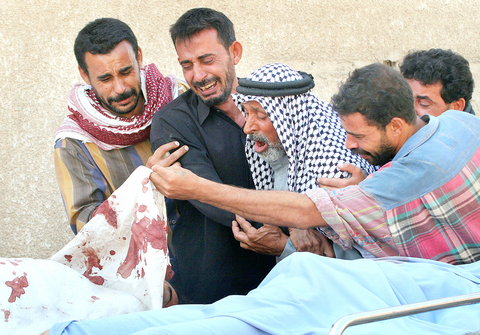Insurgents killed nine Iraqi soldiers yesterday in a town north of Baghdad -- seven of them in an armed assault on a checkpoint and two others in a car bombing more than an hour later, Iraqi officials said.
The attacks came a day after a surge in violence -- including suicide bombings and ambushes -- killed at least 60 people across the country, shattering a relative lull for the previous week.
Yesterday's first attack occurred about 5am when gunmen firing mortars, machine guns and semiautomatic weapons stormed a checkpoint in Khalis, northeast of Baghdad. Seven soldiers were killed., and three injured.

PHOTO: AP
At 6:30am, a car bomb parked alongside a road exploded as an Iraqi army patrol passed, killing two soldiers and wounding another.
The deadliest bombing Sunday hit an army recruiting center at Muthana airfield in central Baghdad when a man dressed in civilian clothes detonated two explosive-laden belts among a crowd of recruits, killing 25 others and wounding nearly 50. Most of the dead were believed to have been recruits.
It was the bloodiest attack in the capital since July 2 when a suicide bomber blew himself up outside a recruiting center in west Baghdad's Yarmouk neighborhood, killing 20.
Al-Qaeda in Iraq claimed responsibility for Sunday's attack.
In other violence Sunday, a Shiite mother and eight of her children were found shot dead in their beds Sunday in Baghdad. One boy survived. The father, who was not at home at the time, blamed the killings on sectarian hatred.
Also on Sunday, Prime Minister Ibrahim al-Jaafari criticized US and multinational forces for shooting at Iraqi civilians who act suspiciously near patrols or military areas; the US blamed the problem on the growing use of suicide car bombs as an insurgent weapon.
"Terrorists, through use of suicide [vehicles], have caused this predicament," said Lieutenant Colonel Steven Boylan. "They have affected the normal level of trust that people have for one another and have made it difficult to distinguish between normal traffic and a grave potential threat."
Al-Jaafari said that such cases should be handled in a "civilized" way, such as shooting at tires instead of passengers.
Suicide bombers struck elsewhere across the country Sunday. At the Walid border crossing into Syria, two suicide car bombers killed at least seven Iraqi customs officials.
Also, near the northern city of Mosul, a suicide car bomber rammed into a police convoy carrying an Iraqi brigadier general, killing five policemen.
A suicide car bomb in Kirkuk killed at least four civilians Sunday, according to police. A second car bomb was rigged to explode as rescuers rushed to the scene, but it was found and detonated by US troops.

PRECARIOUS RELATIONS: Commentators in Saudi Arabia accuse the UAE of growing too bold, backing forces at odds with Saudi interests in various conflicts A Saudi Arabian media campaign targeting the United Arab Emirates (UAE) has deepened the Gulf’s worst row in years, stoking fears of a damaging fall-out in the financial heart of the Middle East. Fiery accusations of rights abuses and betrayal have circulated for weeks in state-run and social media after a brief conflict in Yemen, where Saudi airstrikes quelled an offensive by UAE-backed separatists. The United Arab Emirates is “investing in chaos and supporting secessionists” from Libya to Yemen and the Horn of Africa, Saudi Arabia’s al-Ekhbariya TV charged in a report this week. Such invective has been unheard of

US President Donald Trump on Saturday warned Canada that if it concludes a trade deal with China, he would impose a 100 percent tariff on all goods coming over the border. Relations between the US and its northern neighbor have been rocky since Trump returned to the White House a year ago, with spats over trade and Canadian Prime Minister Mark Carney decrying a “rupture” in the US-led global order. During a visit to Beijing earlier this month, Carney hailed a “new strategic partnership” with China that resulted in a “preliminary, but landmark trade agreement” to reduce tariffs — but

SCAM CLAMPDOWN: About 130 South Korean scam suspects have been sent home since October last year, and 60 more are still waiting for repatriation Dozens of South Koreans allegedly involved in online scams in Cambodia were yesterday returned to South Korea to face investigations in what was the largest group repatriation of Korean criminal suspects from abroad. The 73 South Korean suspects allegedly scammed fellow Koreans out of 48.6 billion won (US$33 million), South Korea said. Upon arrival in South Korea’s Incheon International Airport aboard a chartered plane, the suspects — 65 men and eight women — were sent to police stations. Local TV footage showed the suspects, in handcuffs and wearing masks, being escorted by police officers and boarding buses. They were among about 260 South

Chinese President Xi Jinping’s (習近平) purge of his most senior general is driven by his effort to both secure “total control” of his military and root out corruption, US Ambassador to China David Perdue said told Bloomberg Television yesterday. The probe into Zhang Youxia (張又俠), Xi’s second-in-command, announced over the weekend, is a “major development,” Perdue said, citing the family connections the vice chair of China’s apex military commission has with Xi. Chinese authorities said Zhang was being investigated for suspected serious discipline and law violations, without disclosing further details. “I take him at his word that there’s a corruption effort under